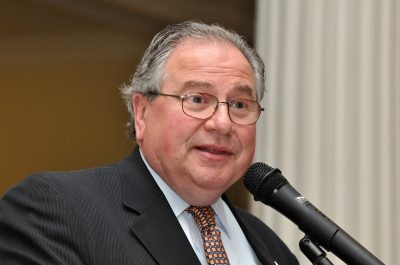
By Joel Lau and Anders Larson
Massachusetts House Speaker Robert DeLeo announced a proposal Friday to fund $1 billion of renewable energy and climate resiliency development in the Commonwealth over the next 10 years.
The proposal would help municipalities across the state adopt new energy and climate technologies, DeLeo said in a press release. The technologies could help reduce greenhouse gas emissions, improve infrastructure and reduce local government costs.
DeLeo said in the release Friday that the grant program, known as GreenWorks, would benefit both the environment and businesses by creating jobs in Massachusetts.
“Not only will cities and towns have the ability to cut greenhouse gases and lower long-term energy and operating costs,” DeLeo said, “but they will adopt Massachusetts-made innovative technologies and put people to work on cleantech infrastructure projects.”
The state’s Executive Office of Energy and Environmental Affairs would distribute the proposed funding. As of late Friday, a bill to fund the program had not yet been filed, a spokesperson for DeLeo told the Boston Globe.
Elizabeth Henry, the president of the Environmental League of Massachusetts, who joined DeLeo to announce the proposal, said in an emailed statement that the nonprofit supports GreenWorks and intends to be involved in the bill’s creation.
“ELM is pleased that climate change mitigation and resiliency is becoming a priority for the MA House this session,” Henry said. “We look forward to working with the Speaker and fellow Representatives to craft a bill that meaningfully addresses these priorities.”
Larry Chretien, the executive director of the Green Energy Consumers Alliance and a former Quincy City Councilor, said the program could fund a number of clean energy options.
“It could be helping a school become more energy efficient,” Chretien said. “It could be installing infrastructure so electric cars can charge up, and a host of other things that meet the definition of clean energy, and I think it’s a great idea.”
Chretien said switching to clean energy sources and energy-efficient technologies would benefit the environment while also being cheaper for local governments than fossil fuels.
“Clean energy over the lifetime of a project has costs coming down — it’s going to be cheaper than fossil fuels over the life of solar panels, electric cars or any of those things,” Chretien said “… The projects should be able to pay for themselves over time, which I think is a great way to unlock those benefits, both economic and environmental.”
Chretien said local governments may need additional financial help from the state to overcome the upfront costs of switching to more sustainable technologies, which are generally higher than the costs of more traditional technologies.
For example, Chretien said, the MBTA or Boston University could purchase an electric shuttle bus that might initially cost more than a traditional bus, but over time the price to power the bus would be cheaper.
“The upfront cost seems to be a sticking point for so many decision makers when they have to go out and buy a bus, and they may not have access to the financing,” Chretien said, “so if this helps unlock some of that financial burden, then I think we’re in good shape.”
Brighton resident David Hilditch, 22, said that in the face of climate change, Massachusetts needs to do as much as it can to develop and implement green technologies.
“If it’s eco-friendly, I’m always open to it. With global warming progressing, we need to be as eco-friendly as possible,” Hilditch said. “I don’t know too much how the community is right now in terms of being green, but if it’s not as good as it can be, it can always be better.”
Angos Oliveira, 27, of Revere, said that he supported the initiative and thought that the state could do more to combat climate change.
“I think the state could do more investing the money in parks and global warming and stuff like that,” Oliveira said, “but would have to, you know, with studies see if that’s enough or not.”






















































































































